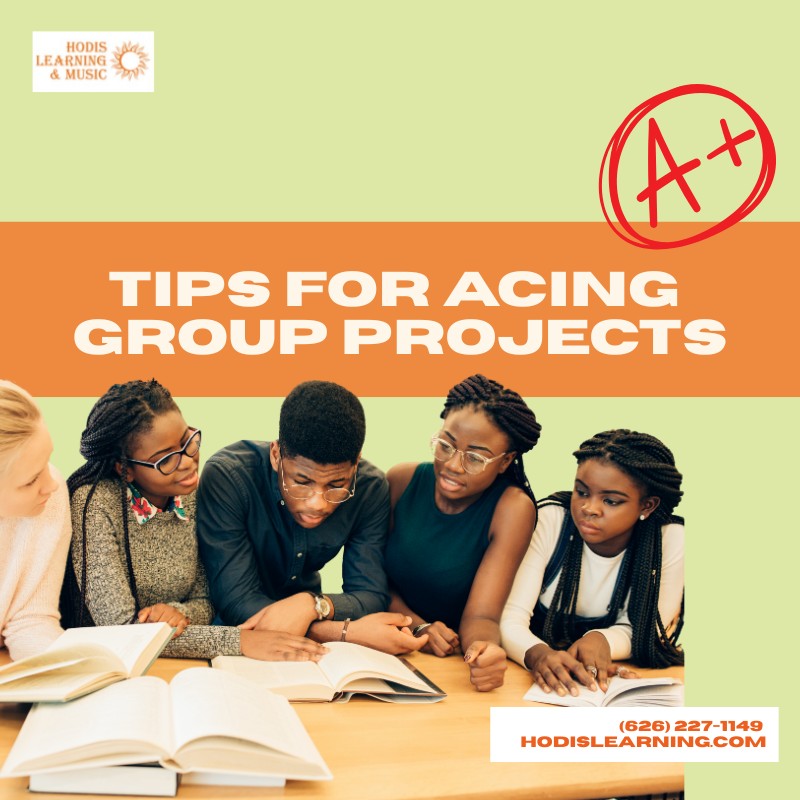Tips for Acing Group Projects
Group projects can be both fun and a little nerve-wracking. They can present challenges when it comes to communication, organization, and accountability. But they also offer a chance to collaborate, share ideas, and learn from others. No matter what grade you’re in, knowing how to navigate group work effectively is a valuable skill that extends far beyond the classroom.
1. Start with a Team Meeting
Before diving into the work, schedule a team meeting (in person or virtual) to introduce yourselves, review the project expectations and grading. The first team meeting is also a good time to discuss each team member’s strengths and preferences and also set clear roles and responsibilities.
Helpful Tip: Assign a note-taker to record decisions and deadlines. Make sure those notes are distributed to everyone after the meeting, so everyone is accountable.
2. Create a Timeline
When it comes to any project, time management is key! Break the project into smaller tasks with specific deadlines. A shared digital calendar or task board can help everyone stay on track.
Here are some tasks you will want to make time for:
- Research and brainstorming
- Drafting or building your project
- Editing or reviewing work
- Final touches and practice for presentations
3. Play to Everyone’s Strengths
Everyone brings something different to the table. Maybe one teammate is great at writing, another likes working with numbers and data, and someone else is skilled at public speaking. Divide tasks accordingly so each person contributes in a meaningful way.
Remember: Fair doesn’t always mean equal. It means everyone is contributing in a way that makes sense for the team and the project. Sometimes, you might have to do work that isn’t your favorite or doesn’t play to your strengths. But it’s still important to do your best and contribute to the project.
4. Communicate Clearly and Often
Keep the communication flowing throughout the project. Use group chats, shared documents, and have regular check-ins. These check-ins can be in-person, over the phone, or virtually on video calls.
If issues arise, talk them out respectfully. Good communication is the key to avoiding misunderstandings and staying productive. If there are consistent issues with communication, say, one member isn’t keeping in touch or attending meetings, speak with your teacher.
5. Use Shared Digital Tools
Using cloud-based tools allows everyone to access and update the project in real-time. Google Docs/Slides/Sheets are helpful for collaborative writing and presentations. Canva is great for easily creating professional-looking designs. Dropbox or Google Drive are good places to organize and store project files.
Make sure everyone knows where to find materials and how to contribute.
6. Support Each Other
Group projects can sometimes be stressful, especially when juggling school, extracurriculars, or work. Be kind and encouraging. A supportive environment motivates everyone to do their best work.
Helpful Tip: A quick “great job!” or “thanks for handling that!” goes a long way.
7. Practice for Presentations Together
If your group project involves a presentation, don’t wing it! Create an outline, or even a script if you need it. Then, set aside time to rehearse together. This helps you smooth out transitions between speakers, make sure everyone understands the content, and builds confidence before the actual presentation.
Take Time to Reflect
After the project is complete, it can be helpful to take a few minutes as a group to reflect. In fact, some teachers may assign feedback or reflection worksheets to understand how the project went. Some of the things you might reflect on include:
- What went well?
- What could you improve next time?
- Did everyone contribute meaningfully?
Group projects help you build real-world skills like collaboration, time management, and leadership. That’s why it’s important to reflect and do your best to be a good team member and leader.
Need Help Along the Way?
At Hodis Learning and Music, we’re here to support students with academic coaching, study strategies, and project planning. Whether you need help organizing your group work or brushing up on subject matter, our tutors are ready.
Call us at (626) 227-1149 or submit a contact form today to learn more.



